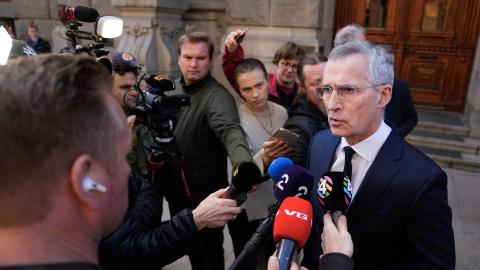The coronavirus is a cross dresser. From a distance, it looks like a cousin of the seasonal flu. Compared to the Black Plague or Spanish Flu, to say nothing of Ebola, it is not particularly lethal. It poses little threat to children, and many people who are infected suffer hardly more than the familiar symptoms of the common cold. As you draw closer, however, it bares its fangs. To elderly people and those with chronic heart or lung issues, it is a killer—and a stealthy one at that. Asymptomatic carriers of the virus are contagious for many days and the virus stays alive on doorknobs and other surfaces for relatively long periods of time. As a result, it disperses itself widely without detection.
The benign face of the virus has tricked some politicians into thinking they can fight it with pep talks, advising their people against hysteria, and encouraging business as usual. The shortcomings of that approach are evident in the case of Milan, Italy. At first, the local government recommended social distancing, but then the mayor, no doubt concerned about the economic cost of keeping everyone at home, delivered a pep talk, encouraging people to go out and live a little. The bars and restaurants filled up again. Meanwhile, the hospitals believed that they were prepared for the worst.
Then the virus revealed its menacing face. An exponential explosion of cases erupted, quickly overwhelming the medical system, which lacked, among other things, an adequate number of ventilators. Overcrowding in hospitals further increased the spread of the virus. Doctors and nurses were worked to exhaustion.
The Italian example proved the wisdom of the approach taken by Israeli Prime Minister Benjamin Netanyahu, who did not fall prey to the pep-talk delusion. He determined that the best solution was to slow down the spread of the virus, thus delaying or possibly preventing the hospital overload that the Italians are now experiencing. Although some in Israel argued, “let’s not ruin our economy just because of a flu,” Netanyahu opted instead to take draconian measures: forcing anyone who enters the country to spend two weeks in quarantine, banning large public events, and closing schools.
This strategy will slow the advance of the virus, buying time to prepare facilities and acquire necessary equipment such as ventilators. In the absence of these strict measures, elderly and vulnerable coronavirus patients would quickly pack intensive care units. Some would die, and others would take beds away from patients suffering from other illnesses and injuries, resulting in a much greater loss of life—perhaps ten times as many people dead. Of course, the immediate blow to the economy will be severe. But letting the virus run rampant would, in the long run, impose an even heavier economic cost.
While most Israelis accept these arguments and the burdens they generate, the consensus is not without significant political implications.
Netanyahu led the country to this strategy in the aftermath of Israel’s latest election, its third in less than a year. Yet again, the results were inconclusive, with neither party enjoying an obvious path to assembling a coalition. Netanyahu worked to rally the nation while serving as a caretaker prime minister. The crisis thus allowed him to appear Churchillian, making very tough decisions and calling for shared sacrifice. As he successfully played the role of father of the nation, the leaders of Blue and White were working to topple him.
Here they made what was very likely a fatal blunder. To put together a minority government, Blue and White’s leader, Benjamin Gantz, opened negotiations with the predominantly Arab Joint List—a step that, during the election, he promised never to take. Some members of the Joint List have extreme, anti-Zionist views that are anathema to a significant segment of Blue and White voters.
Gantz seems to have calculated that breaking a campaign promise was worth the risk. If the negotiations with the Joint List had succeeded, they would have allowed Gantz not just to topple the Likud from office, but also to decapitate it. Netanyahu is currently facing indictments for breach of trust, accepting bribes, and fraud. Israeli law permits him to remain as prime minister while fighting the charges, but it will not allow him leave office and come back while still under indictment. Thus replacing Netanyahu today would remove him from the scene for a very long time, possibly forever.
But there are reasons to think that Netanyahu’s exit from the political stage may not come so soon. Gantz’s gambit appears to have failed, not least because two members of his own party and the leader of the Gesher Party, a natural coalition partner, balked at his efforts to ally with the Joint List. Meanwhile, Netanyahu has seized on Gantz’s misstep by calling for Blue and White to join with Likud in a national unity government in order to tackle the emergency presented by the coronavirus and the related economic challenges.
Regardless of how the negotiations over a unity government finally shake out, Netanyahu now has the upper hand. Gantz must either accept Netanyahu’s terms or take Israel into a fourth election. That prospect must horrify him. If it comes to another election, Netanyahu will excoriate Blue and White for reneging on a campaign promise and seeking an alliance with anti-Zionists, and this line of attack will strike a chord even with some voters who supported Blue and White in the last election.
Only a few months ago, Netanyahu’s detractors had predicted that his political career was over. Once again, he is demonstrating himself to be one of the most adroit politicians of our time. He is not out of political and legal limbo yet, not by any stretch of the imagination. But his chances today look far better than they have at any time in the last six months.
Read in Eurasia Review



















